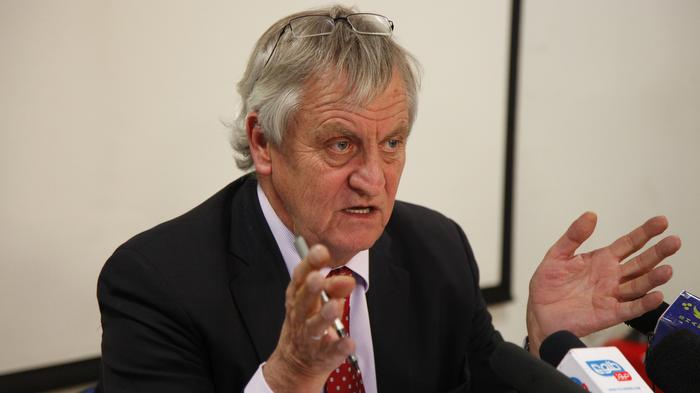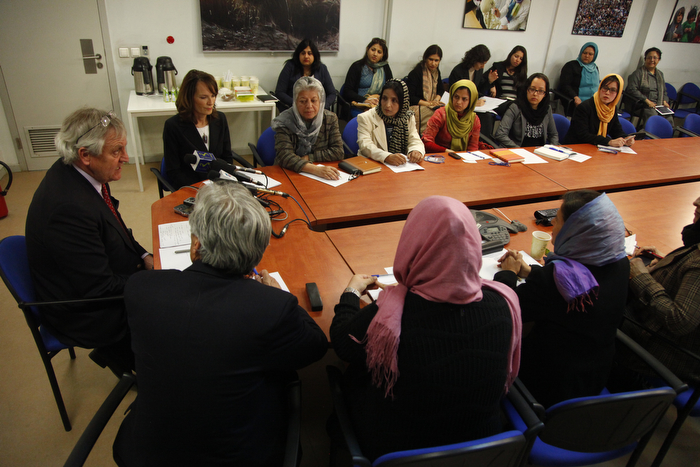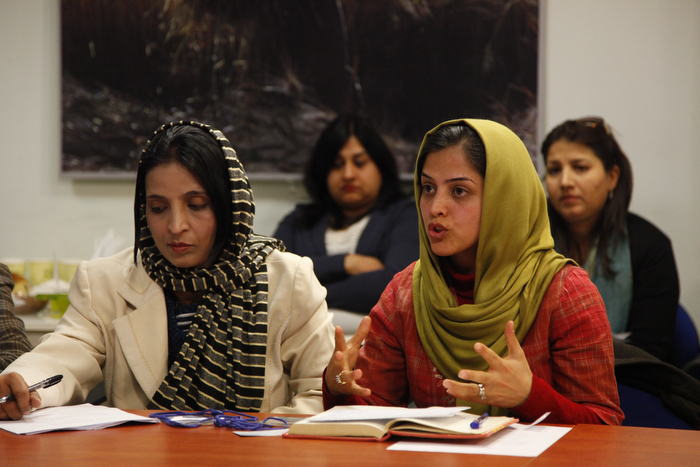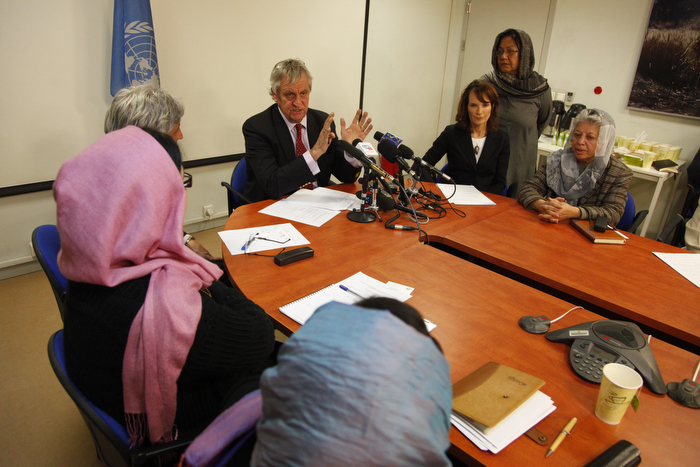KABUL - A senior official with the United Nations Assistance Mission in Afghanistan (UNAMA) today told a group of representatives of civil society organizations that the Mission continues to strongly advocate for enhancing women’s participation and inclusion in all political processes, including in all stages of the electoral process.“We intend to give the fullest support to women in their struggle to establish the fullest participation in the electoral and political process and, even more generally, in regard to their prominent position in the public life of the nation,” said the UN Secretary-General’s Deputy Special Representative and acting head of UNAMA, Nicholas Haysom, at a meeting with the representatives in the capital, Kabul.
Those attending the meeting included representatives from Afghan women rights organizations, election observer groups and the Independent Election Commission of Afghanistan (IEC).
In his remarks, Mr. Haysom said that two of the qualities both Afghans and international community would be looking for in this election were inclusivity and integrity.
“One of the most important indicators of inclusivity will be women’s participation in the elections,” he noted, adding that the ballot was "the best weapon that women had to place their concerns on the table” and to have them addressed.
The UNAMA official noted that one of the most important “pressure points” was the pressure exerted by civil society organizations and, in particular, on the issue of elections and women’s participation.
The meeting with Mr. Haysom is part of a regular series held by senior UNAMA officials with civil society activists, which provide an opportunity to discuss Afghan civil society’s impressions and concerns, which then feed into UNAMA’s on-going advocacy efforts around the elections.
The UN official described the upcoming elections as very important, both for any new government to have legitimacy amongst Afghans and for the international community to continue its support to Afghanistan, which, he said was a “chronically aid dependent society in need of continued international support.”
“We also think it is a very important moment to deepen and strengthen democratic practice and culture in Afghanistan,” added Mr. Haysom, who also reiterated that UNAMA intended to remain steadfast in its commitment to Afghanistan, stating that “we are here and will be here for a long time to come.”
Most of the meeting's attendees voiced concerns that the prevailing security situation may hinder greater participation of women in the Presidential and Provincial Council elections, slated to take place on 5 April, and other political processes.
In addition, they pointed out difficult climatic conditions and cultural, traditional and financial constraints as key challenges to women’s participation in the electoral process.
The representatives also told Mr. Haysom about awareness-raising programmes undertaken by their respective organizations to mobilize women throughout the country and encourage their participation in the elections.
“We have increasing support from Afghan youth in favour of women’s participation while the media is playing a pivotal role in encouraging women through their participation in dialogues and debates concerning electoral process,” said on the meeting’s participants, Najla Ayubi from The Asia Foundation.
Another participant, Hossai Wardak, called for the IEC and the Ministry of Interior Affairs (MoIA) to start undertaking practical steps regarding their promises for ensuring the security of women during the electoral process.
The IEC’s Director of Capacity Building, Dr. Shahla Haque, told the meeting that the IEC had started the process of appointing election staff throughout the country and 30 per cent of the appointed staff members, so far, were women.
“We have appointed 1,450 community mobilizers in 34 provinces of the country, and 33 per cent of them are women,” said Dr. Haque, adding that 21 per cent of the 3,198 regional election observers were women.
The IEC official said that out of 2,713 candidates standing for Provincial Council positions, 11 per cent were women, and they had been given special assistance by the Commission in relation to the publication of election material and capacity building.
Dr. Haque also noted that 3.6 million new voters were registered under an ongoing vote registration top-up exercise, which would continue until two weeks before the elections, and 35 per cent of the newly-registered voters were women. She also told the meeting that 41 per cent of the over 21,000 polling stations in the country have been specified for women so that they could cast their votes without difficulty. In addition, 18 per cent of IEC election observers, both national and international, were women; the MoIA has appointed 13,000 female searchers to perform security checks for women during the elections and they were currently undergoing necessary training.
Senior UN officials have continually emphasized that the level of women’s participation in the upcoming Presidential and Provincial Council elections will be a key measure of the success of the polls.
In his latest report on Afghanistan to the Security Council, Secretary-General Ban Ki-moon raised the issue of women’s participation in the 5 April elections and their protection from violence.
“The participation of women — not only as voters, but also as candidates, electoral workers and observers — will be a key measure of the representativeness of these elections. State institutions and security forces must remain impartial, and I welcome President [Hamid] Karzai’s clear instructions in this regard,” Mr. Ban wrote in the report.
On increasing violence against Afghan women, Mr. Ban said greater commitment to the implementation of the law on the Elimination of Violence against Women remains “a critical government responsibility.”
“Amid the uncertainty of transition, many Afghans, particularly women, fear that human rights achievements risk being forfeited for the sake of short-term political expediency.”
The UN, through its good offices function, continues to raise concerns, including those related to inclusivity and participation, with appropriate authorities.
UNAMA to advocate for enhanced women's participation in elections, senior official tells meeting
- 19 March 2014
- News stories









